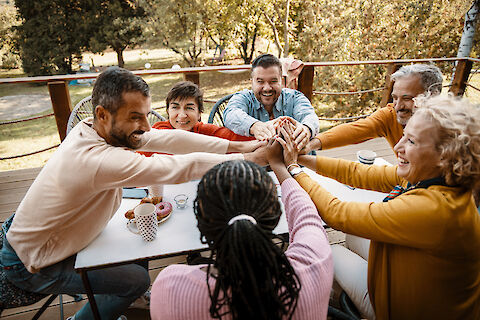
Intergenerational friendships bring a wealth of benefits to our lives, from diverse perspectives to shared wisdom and support. However, navigating communication across different age groups can be challenging.
In this blog post, courtesy of Senior Helpers Whittier-Downey, we'll explore common communication barriers that can arise within intergenerational friend groups, such as varying conversation topics, modes of technology, scheduling issues, and age-related stereotypes. We'll also discuss how to understand them so these issues can be addressed.
Common Communication Barriers
A key aspect of building strong friendships is communication. When interacting with friends from different age groups, several barriers may arise, affecting the way we connect with others.
Different Conversation Topics and Concerns
One of the most significant barriers in intergenerational friendships is navigating the generational gap in interests and experiences. Each age group has its own unique set of cultural touchstones, events, and developments that have shaped their lives, which can make it harder to find common ground in conversations. Additionally, some age-related topics may be sensitive. This makes it challenging to navigate with empathy and understanding.
Different Modes of Technology and Communication
Technology preferences can also create communication hurdles between generations. Some people might be more comfortable with phone calls, while others prefer texting or connecting via social media platforms. Accommodating different communication styles and platforms can be challenging. This is especially true when not everyone is familiar with using various applications.
Scheduling Issues
Scheduling can be another barrier in intergenerational friendships, as work, family, and social commitments often vary across different age groups. Moreover, energy levels and routines might differ, making it harder to find mutually convenient times to meet up or chat.
Age-Related Stereotypes and Assumptions
Finally, age-related stereotypes and assumptions can impact communication in intergenerational friend groups. Misconceptions about abilities, interests, or personal qualities based on age can lead to misunderstandings or even exclusion within the group. Being mindful of these biases is crucial for creating a welcoming and supportive environment.
Approaching Communication Barriers
To address these communication challenges, try to be open, flexible, and empathetic.
Openness and Curiosity
By approaching conversations with curiosity and willingness to learn, we can better understand different perspectives and experiences. Asking questions and sharing personal stories can bridge gaps and create a stronger bond between friends of different ages.
Flexibility and Compromise
Being flexible and open to trying new communication methods or activities can help accommodate different preferences within the group. Finding a balance between the needs and desires of each member will create a more inclusive and harmonious dynamic.
Empathy and Validation
Acknowledging and respecting different experiences is vital to fostering empathy and support within intergenerational friendships. By validating one another's perspectives, we can build trust and understanding, ensuring everyone feels heard and valued.
Get Support and Encouragement From Senior Helpers
By understanding and addressing the common communication barriers present in intergenerational friend groups, we can foster meaningful connections that span generations. For seniors living in Whittier, Downey, Pico Rivera, and Bell Gardens, Senior Helpers Whittier-Downey is here to support you in your golden years. Contact us today to learn more about our senior care services and resources.